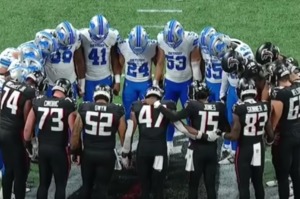Pastor settles for $4.4M after years in prison for crime he didn't commit; town denies wrongdoing

A pastor who spent eight years in prison settled for $4.4 million following a lawsuit he filed against a North Carolina town and arresting officers he says withheld critical evidence that proved his innocence. The town has denied any wrongdoing.
Rev. Darron Carmon served eight years in prison following an armed robbery conviction in 1994 and was released in 2002 for good behavior. Carmon and his legal team said they tried negotiating with the Town of Winterville before filing the civil suit, ABC11 reported Friday.
The Winterville pastor, who founded the Rebuild Christian Center Church in Winterville and Greater Village Gate Church in Lewiston, filed the lawsuit after Pitt County Superior Court Judge Marvin Blount overturned his conviction in 2022 and he received a pardon of innocence from North Carolina Gov. Roy Cooper in November.
"I don't agree with what I had to do to get here. I feel like it should've been a simpler process. I've had to prove my innocence about three times," the pastor said in a statement shared by the outlet. "Next for me is to continue what I have already been doing. I have organizations in place to address certain issues; mentoring for kids without fathers and 'People Against Racism.'"
In response to an inquiry from The Christian Post, a spokesperson for the Town of Winterville pointed to a November statement outlining the events leading up to Carmon's 1994 conviction and the eventual lawsuit.
The town rejects Carmon's accusations of wrongdoing in the "strongest possible terms."
The town says a clerk at a Fresh Way store identified Carmon as the suspect who carried out an armed robbery at the store in 1993. Investigating officers had shown him a photographic lineup of booking photographs, and the clerk repeated the accusation during the criminal trial, saying there was "no doubt" that Carmon was the man who had threatened his life and robbed the store.
"The District Attorney who prosecuted the case testified in this civil proceeding that having eyewitness testimony as the only available evidence in a convenience store robbery case was typical for the early 1990s," the Town of Winterville said in its statement. "Surveillance cameras were not in general use in Greenville-area retail stores at the time, much less in a small-town convenience store."
Police arrested Carmon, who was 19 years old at the time and under 6 feet tall. But the store clerk described the suspect as 6 feet tall with an Afro, according to the lawsuit that Carmon filed. The complaint accused the officers of concealing fingerprint evidence taken from the Fresh Way store when it did not match Carmon's.
In its November statement, the Town denied that officers lied about the store clerk's description in their report, saying that the only evidence of this is based on a statement Carmon's parents alleged they overhead from a leading officer on the case.
"Mr. Carmon's parents testified that the investigating Officer made this statement at the police station when the store clerk was going through the photo lineup book in which he identified Mr. Carmon as the robber," the statement continued. "However, the investigating Officers both testified that the photo lineup was shown to the store clerk at the Fresh Way, not at the police station."
Regarding the fingerprints, the town says that the Winterville Police Department had preserved in an investigative file a set of latent prints reportedly taken from the convenience store on the night of the robbery. It further noted that the prints do not appear to have been adequately analyzed until 2021.
"To this day, it is unknown why or where the prints were taken, whether the palm print was recognized in 1993 as potentially useful for comparison, or who had knowledge that the palm print was in the file," the town said.
"North Carolina law enforcement did not have the technology to transmit or search palm prints in a statewide database until 2008, and the first national searchable palm print identification database was not available until 2013, 20 years after this armed robbery."
The town further argued that, at the time of the robbery, Carmon had been indicted on forgery charges, and the statement claimed that his alibi had changed over time.
In October, the pastor participated in a court-ordered mediation alongside the town and the officers, according to the press release. Insurance companies representing the town and the officers engaged in negotiations, agreeing to settle the lawsuit.
"Neither the Town nor the Officers paid any of the settlement proceeds, as the full settlement amount will be paid by the insurance companies. As part of the settlement, all parties specifically agreed that neither the Town nor the Officers admitted to any wrongdoing," the Winterville press release concluded.
"While the Town believes strongly that there was no wrongdoing by the Town or its Officers, the Town is pleased to have this matter resolved, and is ready to move forward."
Samantha Kamman is a reporter for The Christian Post. She can be reached at: samantha.kamman@christianpost.com. Follow her on Twitter: @Samantha_Kamman




























